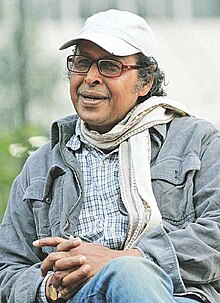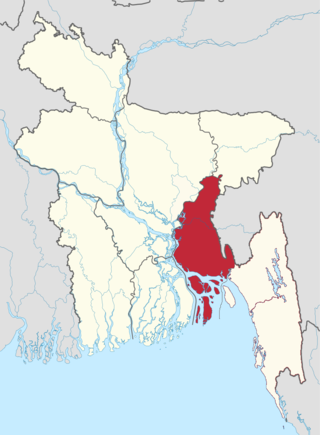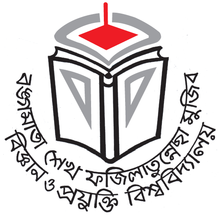Gazi Rafiq | |
|---|---|
 Gazi Rafiq in 2014 | |
| Born | September 1, 1958 Feni, Bangladesh |
| Occupation | Poet, scientist |
| Alma mater | University of Chittagong |
Gazi Rafiq (Rafiqul Islam) is a Bangladeshi poet [1] of the 1980s era and a food scientist. [2]
Gazi Rafiq | |
|---|---|
 Gazi Rafiq in 2014 | |
| Born | September 1, 1958 Feni, Bangladesh |
| Occupation | Poet, scientist |
| Alma mater | University of Chittagong |
Gazi Rafiq (Rafiqul Islam) is a Bangladeshi poet [1] of the 1980s era and a food scientist. [2]
He was born on September 1, 1958, at Nur Boxh Miaji house in Feni, Bangladesh. His parents are Abdur Rahman (retired teacher) and Begum Jarifa Khatun. [3]
After completing graduation from the University of Chittagong [4] he pursued his career in journalism.
Source: [5]

Feni is a coastal district situated in the south-east of Bangladesh, within the Chittagong Division. One of Bangladesh's smallest districts, it is strategically located along the Dhaka–Chittagong transportation corridor. Bordered by India to the north and the Bay of Bengal to the south, it serves as the sole entry point linking Chittagong, the country's primary port city, to the northern districts.

Aminul Islam is a poet and essayist from Bangladesh. He has written 28 books including 23 books of poetry. He has been involved in creative writing for some 25 years.

My TV is a Bangladeshi Bengali-language satellite and cable television channel owned and operated by V.M. International Limited. It began broadcasting on 15 April 2010, and is based in Hatirjheel, Dhaka. My TV was founded by the late Omeda Begum with the goal to spread the Bengali language and culture. The channel primarily broadcasts entertainment and news programming.
Montazur Rahman Akbar is a Bangladeshi film director, screenwriter, producer, social activist and entrepreneur. He is known for his work in the Bengali-language film industry, which is centered in Dhaka, Bangladesh. Akbar also fought in the 1971 Bangladesh Liberation War.

Meghna Division is a proposed administrative division within Bangladesh for the north-western parts of the existing Chittagong Division, comprising Brahmanbaria, Comilla, Chandpur, Noakhali, Feni, and Laxmipur Districts of Chittagong Division. The headquarter of the division is in Comilla. It covers the south-easternmost areas of the country, with a total area of 12,848.53 km2 (4,960.85 sq mi) and a population at the 2011 census of 16,708,000.

Masud Pathik is a Bangladeshi filmmaker, poet and lyricist. His feature films Nekabborer Mohaproyan (2014) won seven and Maya: The Lost Mother (2019) won eight Bangladesh National Film Awards. Individually, he won the Best Lyrics and Best Story awards. For his poetry, he won the 2013 HSBC Kali O Kalam award for his poem Ekaki Jomin. He won 2023 Bangla Academy Literary Award in the playwright category.
Sania Sultana Liza is a Bangladeshi singer. Her songs have been featured in different albums and films. She was the winner of the musical reality show Close Up-1 at NTV in 2008. She served as the chief judge in the reality show, RTV's Young Star Season 2, 2023 themed Gola Chhere Gao.

Bangamata Sheikh Fojilatunnesa Mujib Science & Technology University is a government financed public university of Bangladesh. Proposed new name is Jamalpur Science and Technology University (JSTU) in 2024, August.

Nuruzzaman Nayan is a Bangladeshi retired footballer who played as a goalkeeper, and is the goalkeeping coach of Bashundhara Kings. As the first-ever Bangladeshi goalkeeping coach, he has achieved Goalkeeping Level 1 in 2016 in Nepal, Goalkeeping Level 2 in 2019 in Australia, and obtained a Goalkeeping A Diploma in 2024 in Malaysia. This is the first time a goalkeeper coach from Bangladesh has received such a highest-level certificate. He was the goalkeeper coach of Bangladesh in 2021 SAFF Championship.
Syed Muhammad Muqim was an 18th-century Bengali poet, author and philosopher who was active during the advent of company rule in Bengal. His puthis are notable as they are interspersed with his own philosophical thoughts on prosody, music, astrology and religions.

Obaidullah Hamzah is a Bangladeshi Islamic scholar, educator and economist. He is the sixth Director-General of Al Jamia Al Islamia Patiya and the head of its Arabic department. He is also the secretary-general of the Bangladesh Tahfizul Quran Organisation, chairman of the sharia supervisory committee of Islami Bank Bangladesh Ltd and Social Islami Bank Limited, the chief editor of the Bengali monthly At-Tawhid and the chief editor of Arabic magazine Balagh ash-Sharq.

Nakshi Pitha or Pakkon Pitha is a type of pitha made from rice flour. It is originally from Bangladesh. Various designs are made on the body of this pitha.

Shwapnil Shojib is a Bangladeshi singer, actor, and anchor. He works on Rabindra Sangeet, folk music and independent music. His full name is Sharif Md Sojib. He was a child virtuoso and has received several national awards. His first stage performance was at the age of five, along with his aunt. He is also a popular anchor of Bangladeshi Channel i. He is listed singer of Bangladesh Betar and BTV. Shwapnil was the first official entry for North American Bengali Conference (NABC) in 2015 from Bangladesh. His first solo album, THE TAGORE TREASURY for G Series, was produced by Agniveena. After that, he released singles "Neel Otol", "Bhanga Goray Rabindranath", "Amar Mukti", "Sunil Sagore" etc.

Lutfor Hasan is a Bangladeshi singer-songwriter, musician, and author. He has released a total of seven full-length solo studio-albums till now. His first solo album named Ghuri Tumi Kar Akashe Uro was released in 2011. In his music career, he has sung more than 600 songs. He is also known for his collaborations with other singers.

Ahmadullah, better known as Sheikh Ahmadullah, is a Bangladeshi Islamic figure, negotiator and social activist. He founded and serves as chairman of the As Sunnah Foundation. He has participated in the invitation work of various international programs including Japan, India and the United Arab Emirates. He also founded IQA.info, an Islamic question and answer website. He is the khatib (preacher) of Bhumipalli Jame Mosque, Narayanganj.
"O Priyotoma" is a Bangladeshi Bengali-language duet song sung by Balam and Somnur Monir Konal and composed by Akassh from the 2023 soundtrack album Priyotoma of the film of the same name, starring Shakib Khan and Idhika Paul. The song is written by Asif Iqbal. The song was released on 27 June 2023. The music video for the song was released on the same day under the music label Tiger Media.

Wazed Gazi was a Bangladeshi football player and coach.
Postogola Cantonment is a cantonment in Dhaka, Bangladesh.
Mustafa Mamun is a Bangladeshi writer and journalist. He is the editor of the Dainik Desh Rupantor. He was also a contributor to several other newspapers, before being the editor of Desh Rupantor. He also wrote many books. He is admired by many in Bangladesh for his writings. He has published more than 100 books.